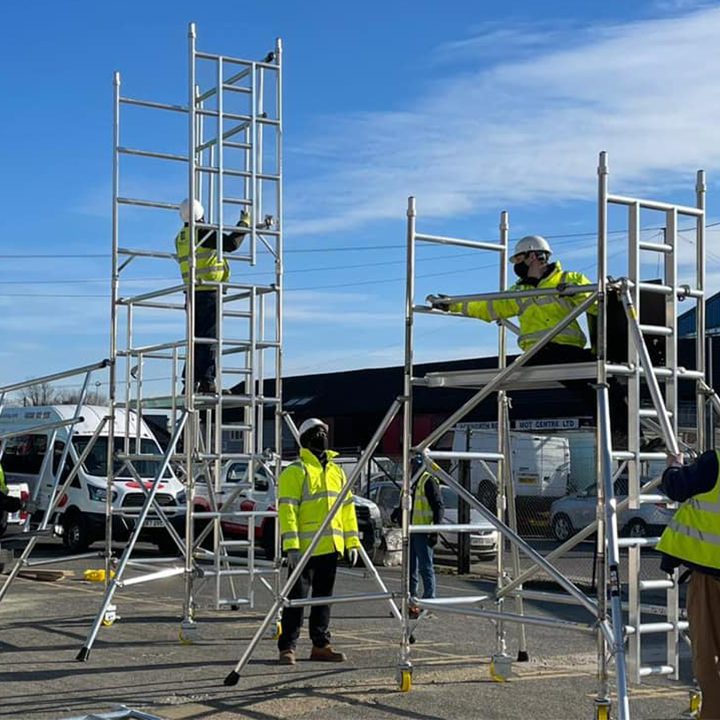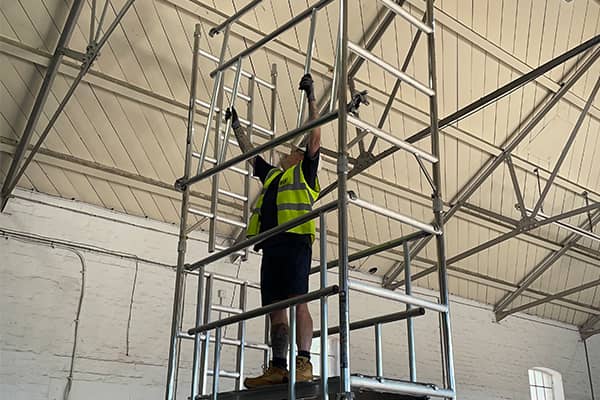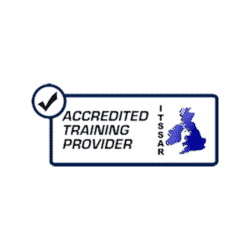What is PASMA?
Although it’s the name of the accrediting body, PASMA (Prefabricated Access Suppliers’ and Manufacturers’ Association) is also commonly used to refer to scaffolding and mobile access towers.
Access tower training teaches you how to safely assemble, use, and dismantle this equipment.
These towers are considered temporary structures, used by workforces to support tasks such as:
- Maintenance
- Construction
- Repairing
- Building
You will need essential training if:
- You manage a team who use scaffolding
- You use your own scaffolding at home
- You use scaffolding at work
When choosing scaffolding tower training, it’s important to understand the different course types available.
Scaffolding training usually combines theory and practical learning. You’ll start with theory to understand key health and safety procedures before moving on to hands-on skills.
This approach helps you reduce the risk of accidents on-site.
Mobile access towers are used for working at height or reaching difficult areas. Their main purpose is to improve safety and prevent incidents. When booking your training, choose the course that matches your work environment and skill level.
Towers for Users
This course is designed for complete beginners. If you’ve never used mobile access towers before, this is the training you need to start with.
Towers on Stairs
Also known as stepped towers or stairway access towers, this course suits those with mobile tower experience. It’s for operators who need to build on their knowledge and learn how to safely work on stairs.
Low-Level Access
This training is also known as podiums, pulpits, room scaffolds, or podium steps. It’s ideal for those working at heights under 2.5 metres.
Working at Heights
Working at heights is typically an entry-level course. Those starting with mobile access towers need to learn the essentials for working safely and securely at various heights.
Do you need a Certificate?
Although it is not a legal requirement to hold a certificate, it is expected that all who are working with the equipment should have the correct training to be able to stay safe and compliant. It is also highlighted in regulation five of the Work at Heights Regulation 2005.
The PASMA card or certificate, often called a PASMA ticket, is valid for five years and widely recognised in the mobile towers industry.
Once it expires, you must complete refresher training to re-validate your certification and card.
To prove you’ve had the correct training, show your operator card. This card confirms you’ve completed the relevant course.
It also lists the tower types you’re qualified to use and reflects your experience. These are marked using abbreviations specific to the PASMA system.

| Letter | Definition | Explanation |
|---|---|---|
| I | Instructor | This is for those who are allowed to teach one or more course. The category abbreviation on the card defines what courses they can teach. |
| M | Manager | This means that you can manage the team who are working at heights. |
| U | User | The standard certification for those who are trained. The category abbreviation states what they are trained to use. |
| R | Professional Tower Rigger | The individual can assemble complex towers. They typically do this as a career, so they will have taken very advanced training and can undertake advanced practical demonstrations. |
| S | Access Tower Specialist | The individual can assemble complex towers. They typically do this as a career, so they will have taken very advanced training and can undertake advanced practical demonstrations. |
| Letter | Category |
|---|---|
| T | Towers for Users |
| L | Low-Level Access |
| W | Work At Heights |
| A5 | Towers on Stairs |
| A6 | Towers with Cantilevers |
| A7 | Towers With Bridges |
| A8 | Linked Towers |
| A9 | Large Deck Towers |
Virtual Certificates from January 2022
From 1st January 2022, the organisation behind the towers training halted the of issuing hard copies of certificates. All candidates who complete and successfully pass their training with 2 Start will now be sent a PDF copy of their digital certificate via email.
This change will mean certificates can be shared more easily and kept in a more secure way via a digital format.
Can you fail a PASMA course?
In short, yes. These courses are assessed by an accredited instructor. If the instructor believes that you are unsafe during practical assessment, they will fail you. You can also be failed if the instructor feels that you are not taking the course seriously, or not paying attention.
Your Earning Potential
According to the Glassdoor salary checker, as of April 2025, a typical scaffolder can earn an average of £35,000, and a potential of £43k. This highlights the benefits of becoming trained, as the knowledge and skills you will gain will make you favourable to employers.
Not only this, but having certified training as one of your qualifications will show the investment you have made towards building your skillsets. This is great to show off to employers.
Can I complete Training Online?
Although some courses include theory-based training, it’s in your best interest to complete mobile towers training with a provider.
Why? Because learning theory in a group encourages discussion and helps reinforce the key competencies you need to cover.
In addition, most training courses require you to complete practical sessions after the theory.
This hands-on practice allows you to apply what you’ve learned and build real confidence in your skills.
Course Durations for Towers
2 Start offers several one-day mobile tower courses, along with two-day IPAF & PASMA combined options. When booking, you can train your entire workforce at once if needed.
Alternatively, you can choose to complete the training off-site, as long as you have the right space and equipment available.












